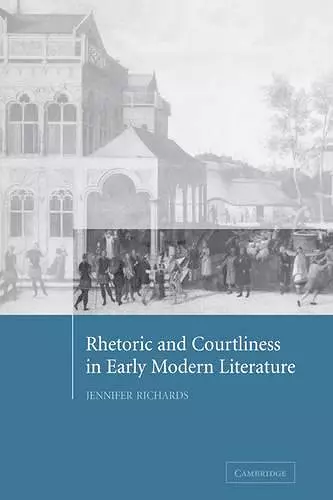Rhetoric and Courtliness in Early Modern Literature
Format:Paperback
Publisher:Cambridge University Press
Published:14th May '07
Currently unavailable, and unfortunately no date known when it will be back
This paperback is available in another edition too:
- Hardback£90.00(9780521824705)

This book explores the early modern interest in conversation.
Rhetoric and Courtliness in Early Modern Literature explores the early modern interest in conversation as a newly identified art. Conversation was widely accepted to have been inspired by the republican philosopher Cicero. Recognizing his influence on courtesy literature - the main source for 'civil conversation' - Jennifer Richards uncovers alternative ways of thinking about humanism as a project of linguistic and social reform. She argues that humanists explored styles of conversation to reform the manner of association between male associates; teachers and students, buyers and sellers, and settlers and colonial others. They reconsidered the meaning of 'honesty' in social interchange in an attempt to represent the tension between self-interest and social duty. Richards explores the interest in civil conversation among mid-Tudor humanists, John Cheke, Thomas Smith and Roger Ascham, as well as their self-styled successors, Gabriel Harvey and Edmund Spenser.
'… valuable approaches … thought-provoking and nicely controversial study.' Notes and Queries
'… well paced and well proportioned … carefully argued and interesting.' Sixteenth Century Journal
'Jennifer Richards' Rhetoric and Courtliness in Early Modern Literature is itself a fine example of cultural history focused on early modern rhetorical concerns. Rhetorica
'… thought-provoking and nicely controversial'. Thomas MacFaul, Oriel College, Oxford
'The argument of Rhetoric and Courtliness in Early Modern Literature is an elegant if complex one. …[this book] is a discriminating and careful work of literary and cultural history.' Criticism
ISBN: 9780521035712
Dimensions: 228mm x 160mm x 13mm
Weight: 332g
220 pages